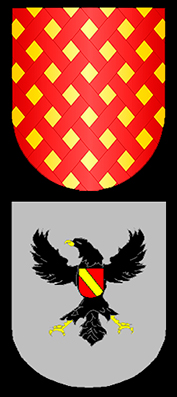Related Research Articles
The name Romero is a nickname type of surname for a Roman or an Italian. The name was originally derived from the Latin word Romaeus and the Greek word Romaios, which mean Roman.
- A person on a religious journey or pilgrimage from Rome
Núñez is a Spanish surname. The Portuguese variant is Nunes. Notable people with the name include:
Barrios is a Spanish surname. Notable people with the surname include:
Enrique is the Spanish variant of the given name Heinrich of Germanic origin.
Ugarte or uharte is a Basque word meaning "island". It can also be spelt HuarteHugarte, or Duarte in Spanish, and UhartDuhart or Duharte in French. Notable people with the surname include:
Hernán is a Spanish masculine given name, originating from Germanic Hernan in the Visigoth culture in Spain. It is the Latinized version of the compound name Fard-nanth, which seems to mean "gentle traveler" or "spiritual traveler". The House of Hernán gave its name to those with the surname Hernández, the -ez at the end denoting membership of that House. The surname, like many Spanish surnames, is of Teutonic-Gothic origin. It is not connected with "Herman" - also of Germanic origin, but a different one.
Francisco is the Spanish and Portuguese form of the masculine given name Franciscus.
Manzano is a Spanish word used for apple trees, and is also used as a patronymic name. Manzano may refer to:
Calvo is a Spanish or Italian surname, meaning bald, which was first used during the Middle Ages. It may refer to:
Garrido is a Spanish surname, meaning "handsome", "beautiful," or "elegant". Notable people with the surname include:
Vera is an Italian and Spanish surname. Notable persons with that surname include:
Lucero is a Spanish surname, deriving from the Spanish “Luz” meaning light. Notable people with the surname include:
Salinas is a surname that has Spanish origin and is derived from the word "salina" meaning "saltworks" or "salt mine". Originating in Spain, it is a common surname in Spanish-speaking countries.
Saavedra is a Galician surname derived from places named Saavedra in the Ourense and Lugo provinces of Galicia, Spain. Saavedra consists of the Galician words saa, meaning "hall" and vedro, meaning "old". Related surnames include Saabedra, Sabedra, and Savedra. The surname Saa is also common.
Bravo is a surname. Notable people with the surname include:
Ferrara is an Italian surname. Notable people with the surname include:

Becerra is a Spanish surname that means 'young calf’, 'young cow’, ‘heifer', 'taurus', 'brahman'. Notable people with the surname include:
Medina is a common Mediterranean toponymic surname of Spanish and Sephardic origin.

Correa is a Spanish surname. Correa is found throughout the Iberian Peninsula. Correa means 'leather strap', 'belt', 'rein', 'shoelace', plural correas. Correa is from the Latin corrigia 'fastening', from corrigere 'to straighten', 'to correct'), applied as a metonymic occupational name for a maker or seller of such articles. Correa is spelt Correia in Portuguese and Galician.

Herrera is a surname of Spanish origin, from the Latin word ferrāria, meaning "iron mine" or "iron works" and also the feminine of Latin ferrārius, "of or pertaining to iron"; or, alternatively, the feminine of Spanish herrero, which also gives the surname Herrero. Variants of the name include Errera, Ferrera and the less common Bherrera. Its equivalent in Portuguese and Galician is Ferreira. Also, because of Spanish naming customs, some people are listed here with their family name as their second-to-last name.